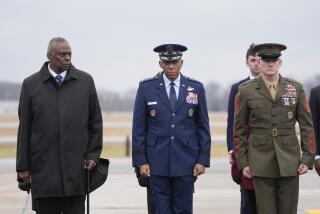Militant Group Claims Its Iraqi Operatives Struck Jordan Hotels
- Share via
AMMAN, Jordan — Islamic militants in Iraq asserted Friday that the deadly coordinated suicide bombings at hotels here this week had been carried out by four Iraqis, raising new concerns that violence was spreading beyond that war-torn nation’s borders.
An Internet posting in the name of Al Qaeda in Iraq, the group’s latest missive claiming responsibility for the bombings that killed 57 people Wednesday at three Western chain hotels, said that Iraqis carrying out the attacks included a husband and wife.
The statement could not be independently verified, but it implies a possible worst-case scenario for Jordanians, and a bloody homecoming for the militant group’s Jordanian-born leader, Abu Musab Zarqawi.
Zarqawi fled Jordan several years ago and, after the U.S.-led 2003 invasion of Iraq, has emerged as the leader of an insurgent group specializing in high-profile bombings of U.S. and Iraqi interim government targets. If Friday’s statement is valid, it means Zarqawi has come full circle, sending Iraqis across the border to strike his homeland.
“This exporting of terrorism is a concern not only for Jordan, but for everyone,” said Taher Masri, a former Jordanian prime minister. “We’re worried that another Afghanistan is under development in Iraq.”
Jordanian authorities continued their investigation Friday into the identities of the bombers, including analysis of security camera footage from the Grand Hyatt, Days Inn and Radisson SAS, the hotels that were struck.
Deputy Prime Minister Marwan Muasher told reporters that 12 suspects were in custody. Under repeated questioning, he said that some of them were native Jordanians.
Critics of the invasion of Iraq say the Amman bombings show that the American military presence is breeding a new generation of terrorists who are beginning to destabilize the region. U.S. officials counter that Zarqawi was a threat to Jordan long before the Iraq war.
Zarqawi was convicted in absentia by a Jordanian court for allegedly planning a series of millennium eve attacks in Amman.
Among the targets in 1999 was the Radisson hotel, which witnessed the heaviest casualties Wednesday when a bomber struck during a wedding party.
Masri, the former prime minister, acknowledged that the Iraq war didn’t create the Zarqawi threat. But he said the 2003 war helped turn the militant, previously an isolated case, into an icon.
“It broadened his base, and now they say he has thousands of people ready to die,” Masri said.
The prospect of Iraqi bombers striking in Jordan also holds chilling implications for the estimated 500,000 Iraqis living here. Jordan is experiencing a wave of nationalism in the wake of Wednesday’s bombings, and spontaneous flag-waving street rallies -- organized through mass cellphone text messages -- dotted the capital on Friday.
Muasher dismissed concerns that the patriotic fervor could turn to anti-Iraqi resentment.
“We do not expect a backlash against Iraqis. Whether the identity of the attackers are Iraqi or not, they would not represent the Iraqi people,” he said. “These are outlaws.”
A U.S. counter-terrorism official said Friday that the suicide bombers each appeared to have been carrying as much as 35 pounds of explosives.
“That would explain the magnitude of the devastation,” the official said.
The Amman government has requested a specialized FBI team of bomb investigators but otherwise is trying to downplay U.S. agencies’ involvement, in order to emphasize Jordan’s sovereignty over counter-terrorism efforts within its borders, the official said.
“We’re not against international help, we just don’t feel it’s necessary right now,” Muasher said Friday.
An FBI official said that authorities saw the infiltration of Jordan by Iraq-based terrorists as cause for concern, but that an even greater worry was whether Zarqawi’s operatives would begin spreading the deadly guerrilla techniques they had repeatedly used in Iraq, including kidnappings and urban combat, to associates around the world.
“The people here, they’re fodder. They’re weapons,” said the FBI official, a veteran counter-terrorism expert. “The greater concern would be the migrating of the skills.”
The thought of Iraqi bombers crossing into Jordan is seen as an odd twist by some in Iraq, where authorities have long accused Jordan of allowing a steady flow of foreign insurgents across the border. The issue has caused hard feelings between the two nations. Many in Iraq view the Jordanian government and people as supporters of deposed President Saddam Hussein and sympathizers of the insurgency.
“Zarqawi is bombing in Iraq and killing Iraqis and he’s Jordanian,” said Jawad Maliki, a member of the Iraqi parliament. “So why is it odd for Iraqis to do the same thing in Jordan?”
Khalil reported from Amman and Meyer from Washington. Times staff writers Solomon Moore, Caesar Ahmed and Saif Rasheed in Baghdad contributed to this report.
More to Read
Sign up for Essential California
The most important California stories and recommendations in your inbox every morning.
You may occasionally receive promotional content from the Los Angeles Times.










